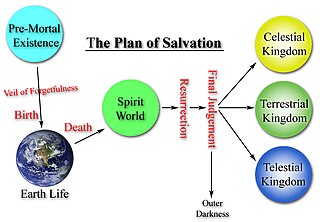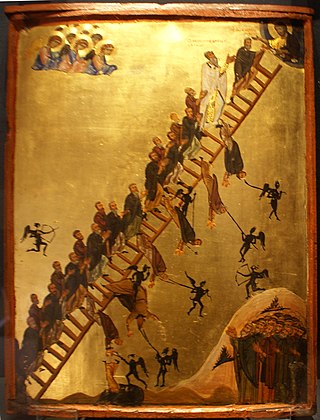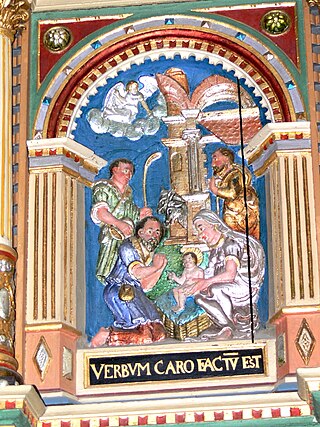The Christadelphians are a restorationist and nontrinitarian Christian denomination. The name means 'brothers and sisters in Christ', from the Greek words for Christ (Christos) and brothers (adelphoi).

The resurrection of Jesus is the Christian event that God raised Jesus from the dead on the third day after his crucifixion, starting – or restoring – his exalted life as Christ and Lord. According to the New Testament writing, Jesus was firstborn from the dead, ushering in the Kingdom of God. He appeared to his disciples, calling the apostles to the Great Commission of forgiving sin and baptizing repenters, and ascended to Heaven.

In Latter Day Saints theology, the term spirit world refers to the realm where the spirits of the dead await the resurrection. In LDS thought, this spirit world is divided into at least two conditions: Paradise and spirit prison:

Mortification of the flesh is an act by which an individual or group seeks to mortify or deaden their sinful nature, as a part of the process of sanctification.

In Christian theology, the Harrowing of Hell is the period of time between the Crucifixion of Jesus and his resurrection. In triumphant descent, Christ brought salvation to the souls held captive there since the beginning of the world.
The Church of God General Conference (CoGGC) is a nontrinitarian, Adventist Christian body also known as the Church of God of the Abrahamic Faith. The Church of the Blessed Hope, some of whose congregations also use the name Church of God of the Abrahamic Faith (CGAF), are a separate denomination, although they share the same origins.
In Christian theology, the world, the flesh, and the devil have been singled out "by sources from St Thomas Aquinas" to the Council of Trent, as "implacable enemies of the soul".
The Confession of Faith of the Evangelical United Brethren Church is one of five established Doctrinal Standards of the United Methodist Church, along with the Articles of Religion, the General Rules of United Societies, the Standard Sermons of John Wesley, and John Wesley's Explanatory Notes on the New Testament. The United Methodist Church adopted the Confession of Faith in 1968 when the Methodist Church merged with the Evangelical United Brethren Church to form the United Methodist Church. The Confession of Faith covers much of the same ground as the Articles of Religion, but it is shorter and the language is more contemporary. The Confession of Faith also contains an article on the Judgment and Future State which had not been present in the Methodist Articles of Religion.

In Christian theology, the incarnation is the belief that the pre-existent divine person of Jesus Christ, God the Son, the second person of the Trinity, and the Logos was "made flesh," "conceived by the Holy Spirit and born of the Virgin Mary," also known as the Theotokos. The doctrine of the incarnation then entails that Jesus was at the same time both fully God and fully human.
Union Espiritista Cristiana de Filipinas, Incorporada is a religious Association with more than a thousand affiliated local and foreign based centers (churches), and considered as the biggest association of Christian spiritists in the Philippines. Foreign based centers are located in California, Texas, Canada, Hong Kong, Macau, Taiwan, Singapore, Greece, Dubai, Abu Dhabi, Hawaii, Germany, Italy, and Russia, where there are large Filipino communities. Union members are called "Christian Spiritists".
In Christian theology, the tripartite view (trichotomy) holds that humankind is a composite of three distinct components: body, spirit, and soul. It is in contrast to the bipartite view (dichotomy), where soul and spirit are taken as different terms for the same entity.

In the context of Christian theology, Christian anthropology is the study of the human (anthropos) as it relates to God. It differs from the social science of anthropology, which primarily deals with the comparative study of the physical and social characteristics of humanity across times and places.
All flesh is grass is a phrase found in the Old Testament book of Isaiah, chapter 40, verses 6–8. The English text in King James Version is as follows:
6 The voice said, Cry.
All flesh is grass,
7 The grass withereth, the flower fadeth:
8 The grass withereth, the flower fadeth:
Christian theology is the theology – the systematic study of the divine and religion – of Christian belief and practice. It concentrates primarily upon the texts of the Old Testament and of the New Testament, as well as on Christian tradition. Christian theologians use biblical exegesis, rational analysis and argument. Theologians may undertake the study of Christian theology for a variety of reasons, such as in order to:

In Christianity, heaven is traditionally the location of the throne of God and the angels of God, and in most forms of Christianity it is the abode of the righteous dead in the afterlife. In some Christian denominations it is understood as a temporary stage before the resurrection of the dead and the saints' return to the New Earth.
General resurrection or universal resurrection is the belief in a resurrection of the dead, or resurrection from the dead by which most or all people who have died would be resurrected. Various forms of this concept can be found in Christian, Islamic, Jewish, Samaritan and Zoroastrian eschatology.
The Pillars of Adventism are landmark doctrines for Seventh-day Adventists. They are Bible doctrines that define who they are as a people of faith; doctrines that are "non-negotiables" in Adventist theology. The Seventh-day Adventist church teaches that these Pillars are needed to prepare the world for the second coming of Jesus Christ, and sees them as a central part of its own mission. Adventists teach that the Seventh-day Adventist Church doctrines were both a continuation of the reformation started in the 16th century and a movement of the end time rising from the Millerites, bringing God's final messages and warnings to the world.

Eternal life traditionally refers to continued life after death, as outlined in Christian eschatology. The Apostles' Creed testifies: "I believe... the resurrection of the body, and life everlasting." In this view, eternal life commences after the second coming of Jesus and the resurrection of the dead, although in the New Testament's Johannine literature there are references to eternal life commencing in the earthly life of the believer, possibly indicating an inaugurated eschatology.

Ephesians 2 is the second chapter of the Epistle to the Ephesians in the New Testament of the Christian Bible. Traditionally, it is believed to have been written by Apostle Paul while he was in prison in Rome, but more recently it has been suggested that it was written between AD 80 and 100 by another writer using Paul's name and style.

John 1:14 is the fourteenth verse in the first chapter of the Gospel of John in the New Testament of the Christian Bible. It asserts that "the word became flesh".









